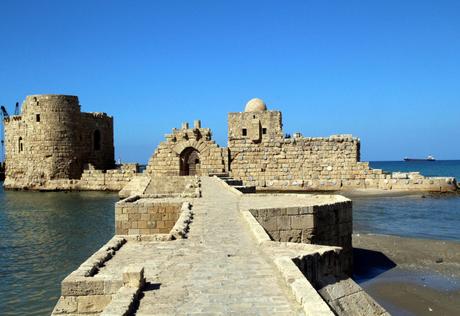
He narrowed his eyes threateningly and the tone of his voice took on an unpleasant chill. “Christianity is dangerous, and you are just part of the problem. Don’t you see that? Don’t the Crusades show you that?”
I cleared my throat. “If you are rejecting Christianity based on the Crusades, then I think you are making a mistake. Many Christian leaders at that time were deeply unhappy with these military campaigns, feeling they did not reflect the life and teachings of Christ. And I would agree with them. You say you don’t like the Crusades? I also don’t like what happened! But you also seem to assume the Crusades reflect Biblical Christianity, and this assumption is simply false. If you want to reject Christianity, then please do so based on the life and teachings of Christ, not the flawed choices of the Medieval Church.”

A strong argument could be made that the Crusades were a period of moral failure in the Medieval Church. At the very least, they show a lack of love for one’s fellow man, particularly one’s enemy.
It always amazes me that people become quick to moralize when moral failures are revealed within the church. “If Christianity were true,” they claim, “the church would be different.” Well – perhaps the human condition IS the very problem you are judging. We are ALL broken and fallen people, and the church reflects this brokenness. It’s not that religions are the problem. People are.
In this series of blogs I’ve attempted to argue that:
1 – The Crusades were a defensive war, fought be people who were promised by the Church that their enlistment would absolve them of all their sins. Our modern sensibilities do not understand how violence can reflect piety. Yet many during this Medieval period were convinced by this.
2 – While the Crusades were defensive, the violence that ensued does not reflect the nature of Christianity as shown by Christ himself. Just check the record of Christ’s life. Worse – I would argue it wasn’t even the Church’s right to embark on a war in the first place. That was the purview of Kings of leaders of state, not spiritual leaders.
3 – Yet by and large, the people who went to war did so in good faith based on what they were taught. They were not fighting to gain personal wealth or power. Crusading cost them. The fact they volunteered is testament to their perceived obedience to God and their piety.
Any examination of the Crusades would be incomplete if it did not include the appalling atrocities committed by the Crusaders during this period. As Crusading fatigue set in, and failures mounted, the fourth and fifth Crusades became a particularly black stain on the already misguided actions of the Medieval Church.
Crusader Atrocities[1]
- People mistakenly believed that Crusading resulted in their receiving the ultimate indulgence (complete absolution of all sin by the church), so they thought this war led to their own complete forgiveness. This resulted in some later Crusaders going to actual war with Christian heretics within the church itself, killing them.
- Tragically, Crusaders eventually attacked the Eastern city of Constantinople. These were the very Eastern Christian peoples who called for help back in the first Crusade days. Now, their Western helpers were coming after them too. Even though Constantinople surrendered to them, the Crusaders massacred the people and sacked the city to pay the financial cost of their brutal, criminal and illegitimate war against a peaceful Christian people. There are various events that mirror this tragedy during the later Crusades.
- The Crusades may have begun with the aim of ejecting an occupying aggressor. And the first Crusade succeeded in doing so for a time. But successive campaigns became less and less successful. Some of the later battles were a poorly managed, out-of-control stream of illegitimate and criminal violence. If the root of the tree is bad, the fruit is not going to taste nice. The Crusades were clearly not a just war, and became an appalling example of bad roots leading to bitter fruit for the Medieval Church.
The original aim of the first Crusade, that of rescuing the Holy Land from Islamic invaders, was never truly achieved. By the time of the seventh Crusade – Islamic armies had retaken Jerusalem, killed everyone there and burned the churches. Everyone was back to square one.
And – to this day, evidence of the Crusaders’ failure is found at the Dome of the Rock in Jerusalem. At this place of deep historical significance for both Judaism and Christianity, the Muslims display their fundamentally anti-Christian message:
“God is only One God. Far be it removed from His transcendent majesty that He should have a son.”[2]
Were the Crusades a Complete Failure?
So – the Crusaders lost the battle. But were their actions a complete failure? Well – it is worth considering the following questions:
1 – Wasn’t it legitimate that they pushed back those Islamic invaders? After all, the invaders oppressed peaceful people and had to be challenged. Right? Perhaps the Western countries would all be Islamic today, were it not for the way that the Crusaders drew a line in the sand – and challenged their aggressiveness in Medieval times?
2 – Could it be that God has purposes in the Medieval Church’s failure? Perhaps he allows us to face defeat because he has a bigger plan in play? Perhaps we see this principle working out in the Crusades. God sometimes brings us into storms to shipwreck, because ultimately he needs us to look to him for our rescue. Not our own strength and wisdom, not religion or human authority, but him.
Am I saying God is able to even use an unjust war, such as the Crusades, for good purposes? Absolutely. Don’t we all reach the end of our lives for one reason or another? What if – this life is NOT all we’ve got? What if much more is awaiting us after we die? And God’s purposes are being worked out both here and there?
3 – Perhaps Christianity is right, that there is a human mess, but it CAN be cleaned up? Could it be that at its core, the original message of Christianity speaks loud and clear to the mess of the Crusades, and also the mess of our contemporary world. God came in the person of Jesus, he entered the mess with the aim of clearing it up. And his plan for clearing up the mess is being worked out day by day.
The Crusaders thought that fighting for the Church earned them forgiveness of their sins. They were wrong. Actually – the Bible has always taught that it’s belief in Jesus and surrendering one’s life to Him that makes his sacrifice count for us. Belief in Christ is the ultimate, lasting solution to guilt and pain in our lives. Forgiveness was bought for us at a high price by Christ, yet it is available to all who truly believe.
If you ultimately choose to reject Christianity, then you are rejecting that offer, not the actions of the Crusaders.
[1] The Crusades Boot Camp, Credo Courses, https://www.credocourses.com/product/crusades-boot-camp/.
[2] The Arabic Islamic Inscriptions On The Dome Of The Rock In Jerusalem, 72 AH / 692 CE, Islamic Awareness, last modified 12th November, 2005, https://www.islamic-awareness.org/history/islam/inscriptions/dotr.
